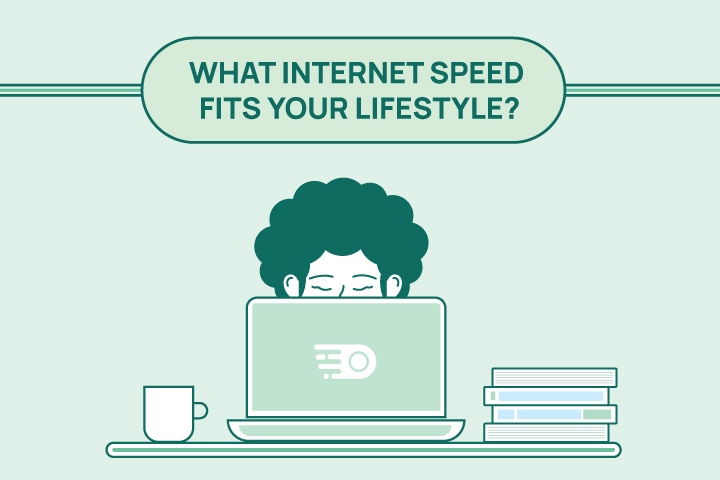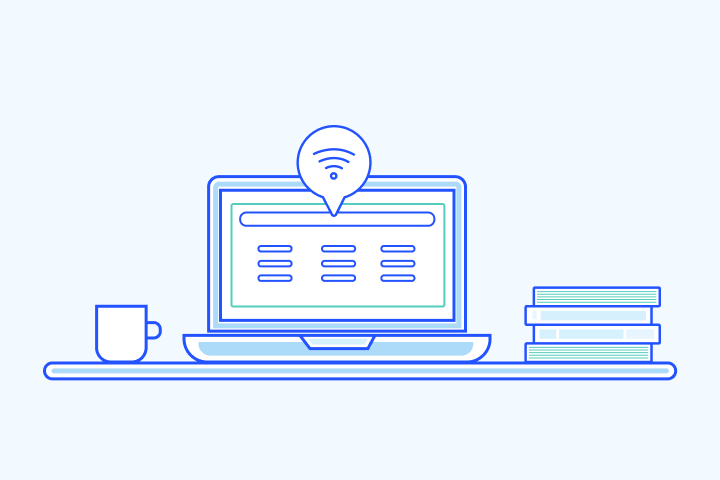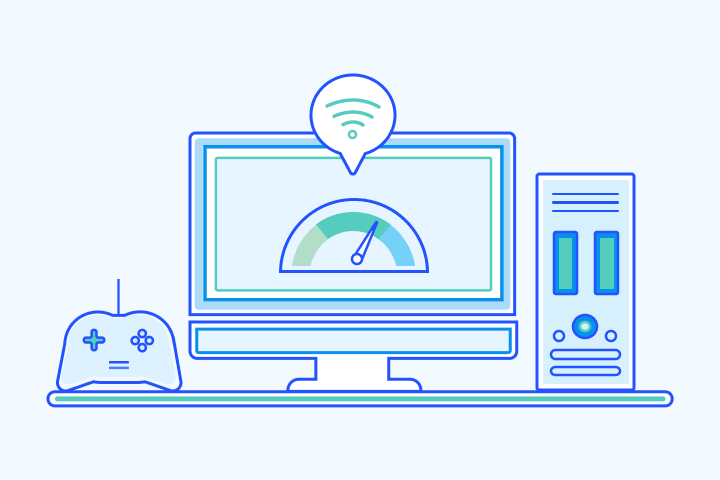What Internet Speed Fits Your Lifestyle?

HighSpeedOptions prides itself on providing honest, quality content. While we may be compensated when you make a purchase through links on our site, all opinions are our own. Here's how we make money.
Table of Contents
To select the ideal internet speed from available internet providers, consider your household’s requirements. A speed quiz offers a fast way to identify appropriate speeds. Additionally, an internet speed test will evaluate your existing connection’s performance.
Need faster internet? We can help you find the best internet in your area at the best price.

How is internet speed measured?
Before we get into what speed you need, it’s important to know how internet speed is measured. Internet speed — measured in megabits per second (Mbps) and gigabits per second (Gbps) — is how fast data and content can travel between your home devices and your internet provider.
According to the Federal Communications Commission (FCC), broadband internet has download speeds of at least 25 Mbps and 3 Mbps upload speed. Download speed is the rate data is transferred to your device, and upload speed is the rate it is transferred from your device to the internet.
Sometimes download and upload speeds are the same, or synchronous, and sometimes they’re different (asynchronous). It depends on the type of connection and the internet provider, but download speed is always faster with asynchronous connections. Since most of what we do on the internet requires transferring data to our devices, download speed is the most important and the speed that is advertised with any internet plan.
How many people & devices are using your internet connection?
While 25 Mbps is a decent starting point, it gets more complicated when there are multiple people in the house using multiple devices at the same time. The simple equation is to multiply 25 Mbps by the number of users. But what if each person is using multiple devices?
A good rule of thumb to determine the minimum amount of speed you need is to allot 25 Mbps per person in your household.
It is common for people to be on multiple devices at the same time. For instance, you could be streaming HD video on your smart TV or Roku device while downloading a file on your computer and checking social media on your smartphone. Then add all the devices you aren’t actively using, such as home security and monitoring, a wireless thermostat, and smart switches and plugs.
The demand on your internet connection can add up quickly. It is important to take an inventory of your online activities and devices when calculating the internet speed you need.
How much speed do I need?
How much internet speed you need is entirely dependent on how you and others in your household use the internet. Here are several questions to consider as you search for internet service:
- How many people use your internet connection?
- Are multiple users streaming HD or 4K video from different devices at the same time?
- Do you spend hours gaming online with friends?
- Are you and others working from home?
- Is your house full of IoT (internet of things) devices?
Activities & Minimum Speed Requirements
| Activity | Minimum Speed* |
| Streaming radio and music | < 1 Mbps |
| General browsing, email, and social media | 1 Mbps |
| Streaming standard video | 4 Mbps |
| Online gaming | 3+ Mbps |
| Video conferencing | 5+ Mbps |
| File downloading | 10 Mbps |
| Online school and telecommuting | 5-25 Mbps |
| Streaming HD or 4K video | 5-25 Mbps |
| Activity | Streaming radio and music |
| Minimum Speed* | < 1 Mbps |
| Activity | General browsing, email, and social media |
| Minimum Speed* | 1 Mbps |
| Activity | Streaming standard video |
| Minimum Speed* | 4 Mbps |
| Activity | Online gaming |
| Minimum Speed* | 3+ Mbps |
| Activity | Video conferencing |
| Minimum Speed* | 5+ Mbps |
| Activity | File downloading |
| Minimum Speed* | 10 Mbps |
| Activity | Online school and telecommuting |
| Minimum Speed* | 5-25 Mbps |
| Activity | Streaming HD or 4K video |
| Minimum Speed* | 5-25 Mbps |
*Recommendations per user from the Federal Communications Commission broadband guidelines.
These are very basic and general guidelines and are the minimum amount of speed each activity requires. There are many factors that influence recommended speed for these activities, but a good rule of thumb is to factor a minimum of 25 Mbps per person in the household.
Take our 2 minute quiz to find the speed that’s right for you.
Find SpeedHow many people & devices are using your internet connection?
While 25 Mbps is a decent starting point, it gets more complicated when there are multiple people in the house using multiple devices at the same time. The simple equation is to multiply 25 Mbps by the number of users. But what if each person is using multiple devices?
A good rule of thumb to determine the minimum amount of speed you need is to allot 25 Mbps per person in your household.
It is common for people to be on multiple devices at the same time. For instance, you could be streaming HD video on your smart TV or Roku device while downloading a file on your computer and checking social media on your smartphone. Then add all the devices you aren’t actively using, such as home security and monitoring, a wireless thermostat, and smart switches and plugs.
The demand on your internet connection can add up quickly. It is important to take an inventory of your online activities and devices when calculating the internet speed you need.
What do I need to know when buying high-speed internet?
When searching for an internet provider and browsing their plans, there are some things to keep in mind before clicking the buy button. Here are some factors to help set your expectations and to consider when calculating the speed you need.
Advertised Speeds vs Actual Speeds
The speeds that internet providers advertise are the maximum speeds possible in that plan. Your actual speeds will almost always be lower than the advertised speed as there are usually multiple devices or users on the same network at once. However, the difference between advertised speeds and actual speeds usually doesn’t exceed 50-100 Mbps depending on your plan.
If you notice a significant difference between your internet plan and home performance, you may want to check with your provider to see what solutions are available. There are plenty of reasons for slow internet that are quick fixes.
Wired vs Wireless Connection
The advertised speed is based on a wired connection through your gateway or router to the internet service provider’s network. The only way you’ll achieve the advertised speed is through a wired connection directly to the modem. But that isn’t how most people connect to the internet.
Most users and devices connect via a wireless router. This is a very convenient method, and often the only way some devices can connect, but it is always slower than a wired connection. And, the more wireless devices connected to it causes congestion, which will slow down your internet speed even more.
Type of Internet
Each type of internet connection has its own idiosyncrasies that will affect speed and performance. Here are the main differences between each:
- Fiber internet is the fastest and most stable of connections, but it has limited (but growing) availability.
- Cable internet is capable of very fast speeds, but because it is a shared connection, speeds will be influenced by the number of other households using that provider’s cable network.
- DSL internet is a widely available and affordable connection type, but the fastest speed available is 100 Mbps. Additionally, the further away your house is from the phone company’s network hub, the slower your speed will be.
- Satellite internet and fixed wireless internet are very convenient solutions, especially for those in rural areas. However, they all require a clear line of sight between your house and the provider’s satellite or tower, and speed can be affected by severe weather. While you can get decent speeds from these types, like Starlink internet, they are considerably slower than fiber or cable.
Is gigabit internet worth it?
Now that you’ve figured out what speed you need and have started shopping for internet options, you’ve probably seen some plans that offer speeds of 1 Gbps (1000 Mbps) or more. Are they worth it? Well, again, that depends on your needs, how you use the internet, and your budget.
If you are a single-user home, 1 Gbps is a bit overkill. But, if you have multiple people in your household using multiple devices, then a gig plan is an ideal solution for you.
And one thing to consider with high-speed, gigabit plans is that having more speed than you need helps “future-proof” your internet connection as technology advances, video content quality increases, and games evolve.
FAQs
Many factors determine the speed you need for online gaming, but the minimum amount of speed needed is 3 Mbps. While more speed is better to stay competitive, don’t forget about latency. The higher your latency is, the slower your response time will be. Check out this guide on online gaming internet speed to learn more.
The minimum amount of speed you’d want to get for streaming is 4 Mbps, and that’s for standard definition video content. You will want at least double that for HD video, and at least 25 Mbps for 4K videos. Have a look at our streaming guide for more information about streaming services and devices.
Netflix suggests 1 Mbps for standard definition video streaming, about 5 Mbps for high-definition, and 25 Mbps for 4K streaming content. If you have multiple streams in your household, those speeds would need to be doubled or tripled. If you are an avid streamer or have multiple devices and people streaming in your household, 100 Mbps would be our recommended minimum.
When it comes to working from home, the more speed the better. You’ll be able to upload and download files faster, work more efficiently if you are using multiple cloud-based systems and services, and have better quality during video conferences. The minimum we would recommend is 25 Mbps, but if more is available and fits your budget, get as much speed as you can.
Find providers in your area
Table of Contents





